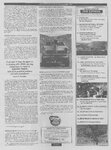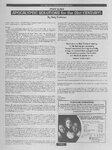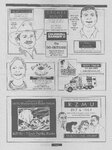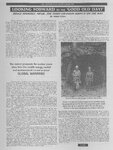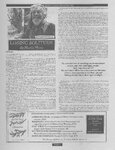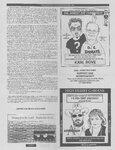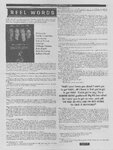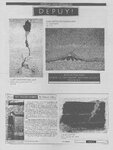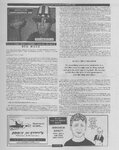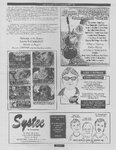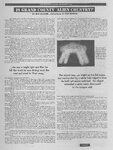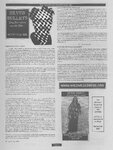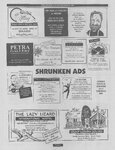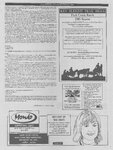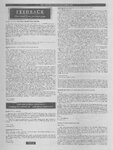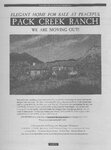| OCR Text |
Show : THE ZEPHYR/ AUGUST-SEPTEMBER Pee THE CK READERS over the West like mushrooms on the dung the welfare cows left behind. However, that one evil has been overtaken by another, greater one, does not mean that a return to the former evil would constitute progress, however much less destructive it may seem by nostalgic RESPOND comparison to the current one. No doubt there is still room in the rural West for responsible ranching and farming, but these will be museum pieces requiring substantial and ongoing subsidy from the federal (or state or local) government, an investment we could all agree to make for aesthetic or historical preservation purposes. In exchange for that subsidy, however, those engaged in such activities would have to agree not to trash the land (and a few exceptions aside, their record on this is not especially good, in spite of the decades of subsidies already received). But this alone will not sustain even a small fraction of those who currently live in places like Moab. Some other solution is required, and hopefully your article will stimulate a EDITOR’S NOTE: It’s been years since we received this kind of response to a Zephyr story, but “The Greening of Wilderne$$” struck a chord, harmonious or otherwise, with many of you. I’ve included as many of the letters as possible and hope we can post even more of them on the web site. Thanks to all of you who took the time to write....JS COMMENTS ON “THE GREENING 2005 Like you, I find my disgust with cows on the federal dole rapidly being overshadowed by disgust at the hordes of well-heeled “adventurers” in search of someone to guide them through their next commodified “experience,” and at the luxury subdivisions sprouting all OF WILDERNE$$” discussion of what it might be. Whatever it is, it will have to be more democratic Thanks for what is possibly the best article you've published to date in that rag of yours (“The Greening of Wilderness in Utah,” Zephyr Vol. 17 No. 2, June/July 2005). I hope it stirs up some healthy controversy and debate, though my fear is that it may fall on deaf ears. I first set foot in Moab late one August night in 1979 and still remember the impression the following day’s first light on the red rock cliffs made upon me. It was the beginning of a lifelong addiction to the sandstone of the Colorado Plateau, where I subsequently lived for several years, some of them in the service of your much beloved former employer the NPS. Though I’m no longer a resident, I feed the sandstone addiction as many times and for as many weeks a year as I can squeeze out of the drudgery of working life. Depressed by the changes Moab has undergone in the last 25 years, I haven't been back since the mid-1990s, and if I do return again, it will most likely be on the way to somewhere else or in an increasingly hypothetical off-season. Sadly, Moab’s fate is hardly unique, as you point out so eloquently in your article. Especially disturbing is the growing use of the outdoors, in Moab and elsewhere, as a proving ground for the latest backcountry toys, be they 4x4’s, mountain bikes, or even backpacking gadgets. Gear ought to be the means to an end, the enjoyment of wilderness for its intrinsic value. However, the opposite is becoming more common, as the outdoors environmental and wilderness organizations, but with American liberalism in general. Thanks for putting in words (and having the courage to publish them) the frustration I've been feeling for years with the liberal version of environmentalism. My own politics have. always leaned several degrees left of liberal, but even so, liberalism had generally seemed preferable to the alternative. However, as liberals cling to certain privileges (like wilderness) for themselves, while selling out much of the constituency that fought for securing such privileges for everyone, I find it harder and harder to give a damn whether liberals get elected or not. Clearly a lot of other people do, too. Too many liberals have fallen for the false promises of the deeply inegalitarian, free-markset logic of unrestrained consumer capitalism, whose only values are profit and the growth that generates it, usually at the expense of equality. But as Abbey also once observed, “growth is the ideology of the cancer cell.” Let’s hope we can all remember this before both environmentalism and the land it seeks to protect succumb to the cancer. Only by heeding Abbey’s dictum can we begin to get turned into a means for the organized, and often competitive, mass consumption of gear. Instead of a refuge from consumerism, wilderness is becoming just another place in which to consume. It is nothing short of tragic that a wilderness movement inspired in part by Abbey’s polemic against industrial tourism should end up promoting what he denounced, or at the very least acquiescing in it. Perhaps even more tragic is this movement's growing financial dependence on some of the very forces it was originally created to fight. Let’s not forget that the wilderness movement from the beginning opposed not only the destructive effects of extractive industries like mining, oil drilling, logging, and ranching, but also those of the rampant tourist development Abbey warned against. To be fair, the frenetic growth of the industrial tourism we bemoan would likely have happened even if the wilderness movement had actively opposed it. Contrary to the frontier mythology of rugged individualism, the old agricultural and extractive economy of the devise more rational, sustainable, and democratic economies for the American West, based on stewardship of the land and equality among its inhabitants rather.than rampant consumerism in the service of growth for its own sake. . Misha Kokotovic San Diego, CA West always required hefty federal government subsidies. It was never viable without such subsidies, and is even less viable today than ever. Given the changes in the national and world economies over the last few decades, some sort of transition to tourism in the rural West was perhaps inevitable. Waa CONTINUED ON NEXT PAGE a S20) SS) club FOOD COURT for mer 7am to 7pm We do breakfast, lunch & dinner Indoor & Outdoor Seating 435.259.6555 STOP BY THE WATERING HOLE! FAMOUS CHICKEN TENDERS! Plus Our Specialty Sandwiches (vegetarian options) Cool & Refreshing Salads TO GO (from scratch...rotating varieties) and egalitarian than the “amenities economy” currently touted by many wilderness organizations, which do not seem very interested in the question of amenities for whom and amenable to whom. The claim that service economies benefit equally the wealthy being served and the underpaid who serve them just doesn’t hold up and can only hurt the cause of wilderness preservation in the long run. The Cloudrock Resort Development you describe is both socially and environmentally obscene, and if wilderness and environmental | organizations fail to actively oppose this sort of development, they will only confirm the charges of elitism long made against them. The environmental and wilderness movements will have to be for everyone, not just for those who can afford the next guided ecoadventure or luxury lodge, or they will be nothing at all. When wilderness becomes synonymous with “exclusive playground for the rich,” who will bother to defend it? In your article you have put your finger on what is wrong today not only with Dear Stiles, | FEEL GAS--- 4 CENTS/GAL DISCOUNT with CASH or CHEVRON CARD TWO CAR WASH OPTIONS "Touchless" with dryer OR "Express" (Express is ONE DOLLAR with fuel, for locals or mentioning The Zephyr ad) 817 S. MAIN STREET in MOAB 5AM-1IPM MIDNIGHT on WEEKENDS oe 19 IT THE MAGIC WATERS OF THE WATERING HOLE? WY NO...JUST THE ZAX AMBIENCE |


